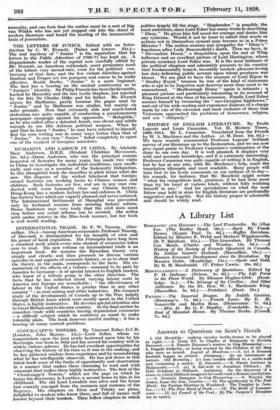• CLOUD-CAPP'D TOWERS. By Viscount Esher, G.C.B. (London. John Murray.
15s.)—Lord Esher, whom we congratulate u the post newly bestowed upon him by his Sovereign, was m in 1852 and has served his country well in widely various spheres. He has had excellent opportunities for observing the history of his time as it was in the making, and he has gathered wisdom from experience and by remembering What he has intelligently observed. He has put down in this latest book some of the fruits of opportunity and observation in a manner that makes them charming to read and with comment that makes them highly instructive. The first of the " Cloud-capp'd Towers," which are the pegs on which he hangs his discourses, is Lowther, a second home to him in his childhood. The old Lord Lonsdale was alive and the house had scarcely emerged from the manners and customs of the Regency. His chapters on Eton and Trinity are pious, delightful to readers who know them, and full of names well *mown beyond their borders. Then follow chapters in which politics largely fill the stage. " Hughenden " is possibly the most ambitious, since Lord Esher has many rivals in describing " Dizzy." He gives him full meed for courage and denies him any cynicism. Would it not be truer to admit that words or actions not in themselves cynical may become so in a Prime Minister ? The author arouses real sympathy for " Dizzy's " loneliness after Lady Beaconsfield's death. Then we have, in " Devonshire House," a disquisition upon the end of Whig influence and an excellent picture of Lord Hartington, whose private secretary Lord Esher was. It is the most intimate of the political chapters and admirably presents to his country that fundamentally honest, incurably modest, pleasure-loving but duty-following public servant upon whom greatness was thrust. We are glad to have the account of Lord Ripon in " Studley Royal," because he was of the kind of statesman who is apt to be forgotten and deserves more than most to be remembered. " Marlborough House " again is intimate ; a pleasant picture and particularly interesting in its account of King Edward at the time of his accession. Finally Lord Esher amuses himself by trouncing the " neo-Geozgian highbrows," and out of his wide reading and experience disposes of a charge made by one of the cleverest and most cocksure of them that Victorians approached the problems of democracy, religion, and sex " obliquely."






































 Previous page
Previous page